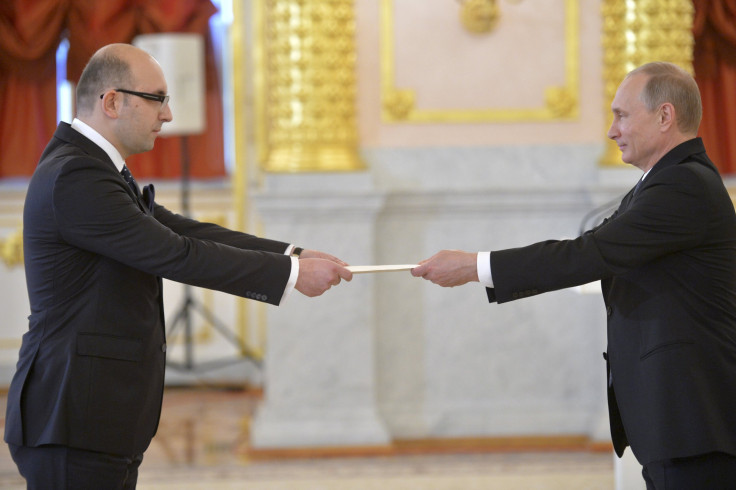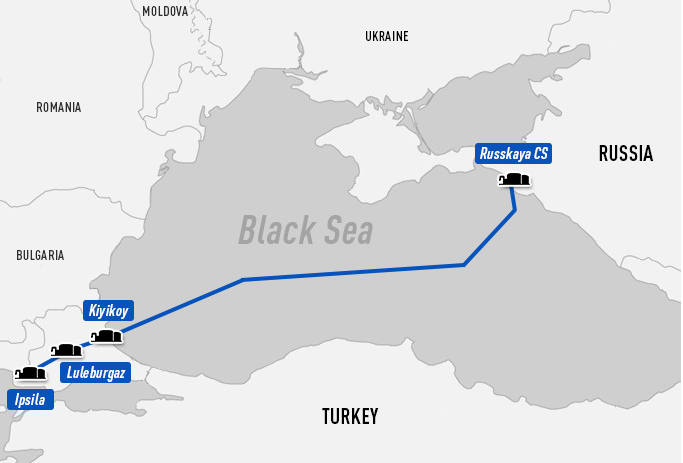Russia Courts European Union's Southern Flank To Bypass Ukraine With Gas Pipelines

BRUSSELS -- The Ukrainian war and a push by Russia to find an alternate path to get its natural gas to Europe are redrawing the energy map of Europe, and may end up pulling the “powder keg of Europe,” the Balkans, into a vast confrontation for access to energy.
Gazprom, Russia’s state-owned oil and gas conglomerate, has been working since 2007 to extend pipelines across the Black Sea and into the eastern Balkans, bypassing Ukraine and ensuring its domination of the natural gas supply in Europe through a new route into the south flank of the European Union.
Ukraine’s rift with Moscow has elevated this priority. Nearly half of the natural gas consumed by Europe each year travels through Ukraine before it enters the union, and Gazprom’s deputy CEO Alexander Medvedev repeatedly has stated on the record that the company will not export gas via Ukraine after 2019. Gazprom’s European gas therefore needs a new route into Europe.
According to Tim Boersma, an expert on European energy at the Brookings Institution, this means “diversifying its supply routes and ending its dependence on transit countries like Belarus and Ukraine. From the Russian point of view, disputes with these countries interfere with Gazprom’s contractual obligations, namely, to deliver to their larger customers in Western Europe.”
The revival of Moscow and the West’s military rivalry is shifting the logistics of energy transport into a geographic battle of influence. The confrontation is now playing out in the southern Balkans, where governments find themselves torn between the pull of possible membership in the European Union and the promise of cheap Russian gas if they opt for Moscow’s orbit.
That conflict is clearly visible in Macedonia, which applied for membership in the EU 10 years ago and has yet to get an answer on when it may join the 28-nation bloc. At a conference of Balkan leaders in late May, Prime Minister Nikola Gruevski lamented that the constant postponement of EU membership “is not a solution. It’s just creating problems, it’s creating new issues, it’s creating uncertainties, and it is a real damage for us and for the region too.”
The delay is creating an opportunity for Russia to court the ex-Yugoslavian country. Moscow is eyeing Macedonia and its neighbors as a possible route for natural gas into Europe, and is promising subsidized gas prices and much-needed investment in infrastructure. Macedonia and neighboring nations including Greece and Bulgaria, both EU members Moscow is courting, will have to choose how to balance their interests in the West and the East.
They are not the first to face that dilemma. When Belarus sold back to Russia its ownership of Gazprom’s pipeline through the country for $2.5 billion in 2011, it received a 40 percent discount on its future imports from Gazprom. Russian President Vladimir Putin described this as an “integration discount,” a reference to what Belarus gets in exchange for closer ties with Russia. In 2015, Gazprom announced an import-substitution program with the nation, where Belarus will pay for gas through the sale of goods to Gazprom.
Bulgaria, a member of the EU with historic ties to Russia, got a 20 percent discount from Gazprom on the price of its natural gas in 2012 and the ability to renegotiate its contract in six years. For Bulgaria, which gets more than 90 percent of its gas from Russia and is the European Union’s poorest country, the lower prices helped: Its economy grew 1 percent in 2013, double the rate of the previous year, according to World Bank data.
Bulgaria had been drifting toward a stronger integration with Russian energy for years, since the now-abandoned South Stream project begun in the mid-2000s sought to extend a gas pipeline across the Black Sea, from the Russian Caucasus to Bulgaria, thus bypassing Ukraine. The line would then extend northwest and southwest, serving Italy, Serbia, Hungary, Slovenia and Austria.
But plans for South Stream were derailed when Bulgaria was put under investigation by the European Commission for violating EU competition laws with the project, and the nation stopped construction of the pipeline in June 2014. “The project is almost entirely dead,” said Julian Popov, former minister of the environment in Bulgaria.
The promise of prosperity that came with the pipeline was groundless, according to Popov. “The support of South Stream in Bulgaria was a result of political pressure and lobbying. The 400 million euros [$450 million] that Putin suggested Bulgaria could have earned from the pipeline was entirely unfounded,” he said.
Gazprom, which is more than 50 percent owned by the Russian government and is the world’s biggest natural gas company, has begun discussions with countries where the European Commission has less influence: Turkey, which is not a EU member, and Greece, locked in a bitter dispute over its debt that may result in its leaving the union.
With South Stream defunct, Russia is betting on Turkish Stream, which would funnel natural gas from the Russian Caucasus to stations in northwestern Turkey, near the borders of Greece and Bulgaria. Officials from Gazprom confirmed last week that the contracts concerning Turkish Stream will be signed by the end of June with Botas, Turkey’s state-owned energy conglomerate.

Greece would be the logical point of entry into Europe from northwestern Turkey. Greek Prime Minister Alexis Tsipras has expressed interest in the revenues to be derived from Turkish Stream, which would serve as Gazprom’s official point of entry into the EU. At the St. Petersburg International Economic Forum on Friday, Tsipras signed a preliminary agreement on Turkish Stream’s expansion across Greek territory. It was only a preliminary agreement, but if Greece were to leave the European Union in the next months, as some now speculate, the long arm of the commission may no longer stretch so far.
The European Union’s failure to provide credible alternatives to Gazprom’s monopoly adds to the likelihood of expansion through the Balkans. “In 2014, the commission told Bulgaria ‘thou shalt not build a pipeline,’ but what now?” said Boersma of the Brookings Institution. “To date, we have seen few new ideas come out of Brussels on an energy union.”
Macedonia’s current leader Gruevski has openly stated that Macedonia will not join the Turkish Stream project until the European Commission and Gazprom see eye to eye on the project.
But with Macedonia locked in a political crisis that may topple the Gruevski government, and opposition leader Zoran Zaev on the record stating that he “supports all pipelines,” Macedonia’s orientation in the big energy game unfolding in the Balkans is far from certain.
A wiretapping scandal is rocking the country, exposing the Gruevski cabinet to accusations of corruption, and sparked mass protests in the capital, Skopje. Gruevski and Zaev met in Brussels last week to find a solution to the crisis. But a EU-sponsored deal, and with it the future path of the South Stream pipeline, remains elusive.
Hopes for rescheduled elections in Macedonia in 2016 stalled as all parties left Brussels with no deal in hand. In a statement released minutes after negotiations ended Friday, European Commissioner for Enlargement Negotiations Johannes Hahn expressed his disappointment in a “lack of responsibility and leadership” and that “citizens deserve better: democracy, the rule of law and a European future.”
That European future remains a hazy prospect for Macedonia. Without a deeper engagement from Brussels, and money from Western investors, Russia and its cheap gas in exchange for ties to Moscow will remain an attractive partner.
“The rest of the world doesn’t share Brussels' and Washington’s view that ‘Russia is an isolated country.’ And neither does the private sector,” said the Brookings Institution’s Boersma.
Turkish Stream is a challenging, expensive project, but Moscow already has promised that it will lend Greece the $2 billion needed for initial construction. Those prospects of investment from Russia are proving hard to resist. “There is a possibility to break Central and Eastern Europe’s single-market dependency on Gazprom,” said Boersma. “But significant investment from the West will be required. I’m not so sure that this will come.”
© Copyright IBTimes 2024. All rights reserved.





















